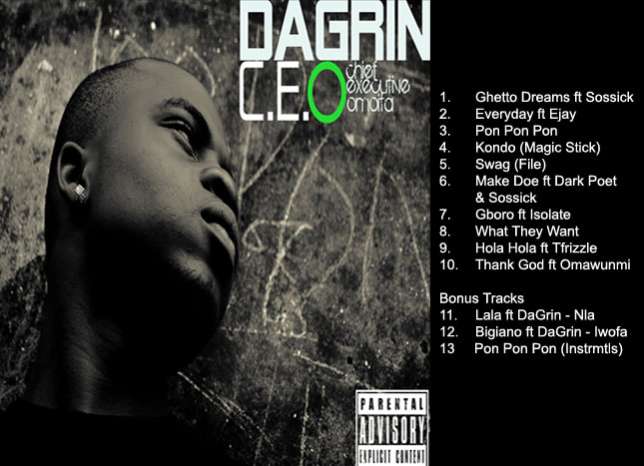
Album – “C.E.O”
Artiste – Dagrin
Record Label – Mi so fun yin Entertainment (2009)
play
Dagrin (Sahara Reporters)
Today (April 22, 2018) marks the eighth year anniversary of rapper Dagrin’s death.
Always a sober fate for Nigerian music, it brings a dose of realism to the glitzy orchestrated world that mainstream music has become. Here was an artiste who had it all, and was nowhere near his peak before he left earth and its fullness, never to return, never to taste again, of his hardwork.
But Dagrin did leave us with his legacy, as a champion of street rap, a genre he led to his tragic death. The core of that work is contained on his acclaimed sophomore “C.E.O” album, which was released in 2009, under his imprint, Missofuyin Entertainment.
play
Late Zara Gretti, Late Dagrin, and Toolz (Plastiq)
After the disappearance of Kash 11 and AY, Dagrin rose to prominence spitting Indigenous rap like Nigeria had never seen. Hindsight will have us look the way of a generation of young Yoruba rap heads, but Dagrin, although not the first, was its poster boy. His debut album dropped in 2006 but failed to light up due to lack of adequate promotion. The debut album, titled “Still on the Matter” was home to songs like ‘Raprules anthem’ and ‘Come back home (Kowale)’ which received medium air-play. With that album, Dagrin showed what he was made of.
The immersive album came laden with street-isnpired wordplay, ingenious metaphors and punchlines, as the rapper hastily revealed his claim to being an Omoita (a street Arab). He recounts his industry and personal struggles on ‘Ghetto Dreams’, where he rhymes on the unalloyed production by Sossick, (who also sang the chorus).
play
Dagrin (Plastiq Shutterchance)
Sossick also had more to do with composition as you could feel his hand on ‘Everyday’, a vehicular track ferrying his personal street-life and how he gets by daily. Hit song ‘Pon Pon Pon’, has Dagrin declaring his street chiefdom, pushing on the requsite credibility with admirable and infectious braggadocio. All of these is sort of formulaic, leading to mass appeal. Dagrin keeps things, employing steady wordplay, metaphors and punch-lines as his tools, often raising the bars in songs like ‘Kondo’, a debauched club hit and ‘Gboro’.
“C.E.O” created the blueprint for what is now celebrated and commercialized as indigenous rap. While not directly inspirational for these generation of stars, it created industry-changing realizations about the potential inherent in this brand of locally generated Hip-hop.
We might have lost Dagrin, but his work gets new life with every new release by today’s street-hop acts.
Rating: 4.5/5
Ratings
1-Dull
2-Boring
2.5-Average
3-Worth Checking Out
3.5-Hot
4-Smoking Hot
4.5-Amazing
5-Perfection
UNDER MAINTENANCE





